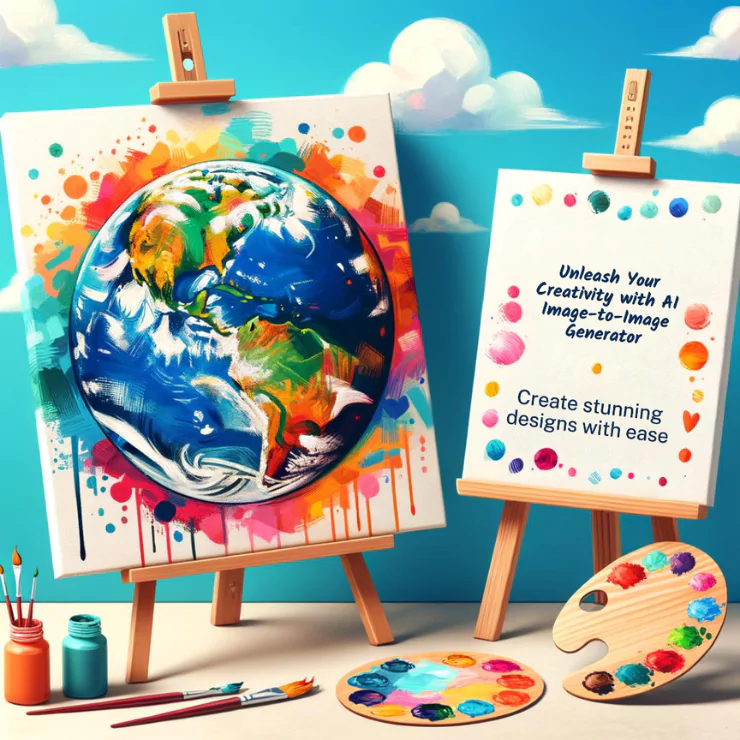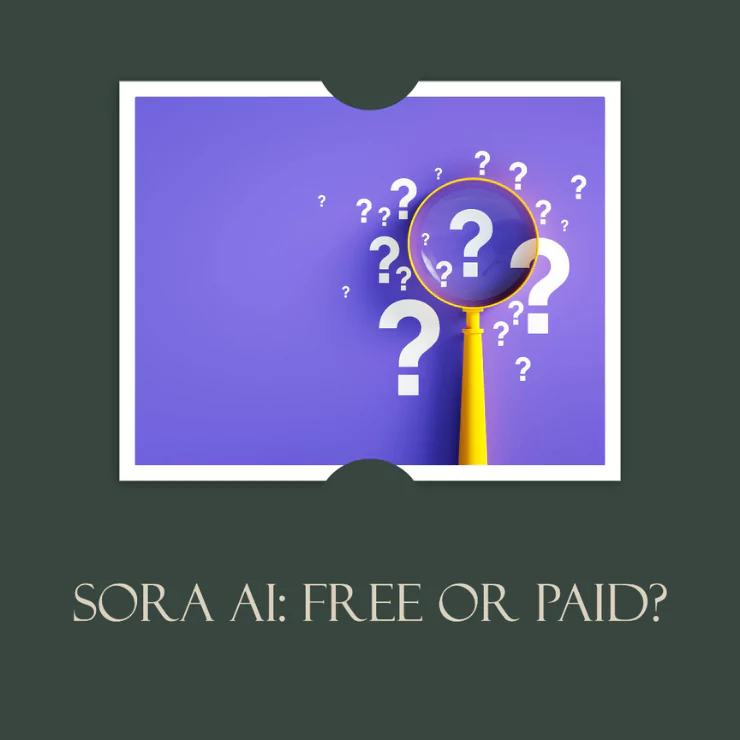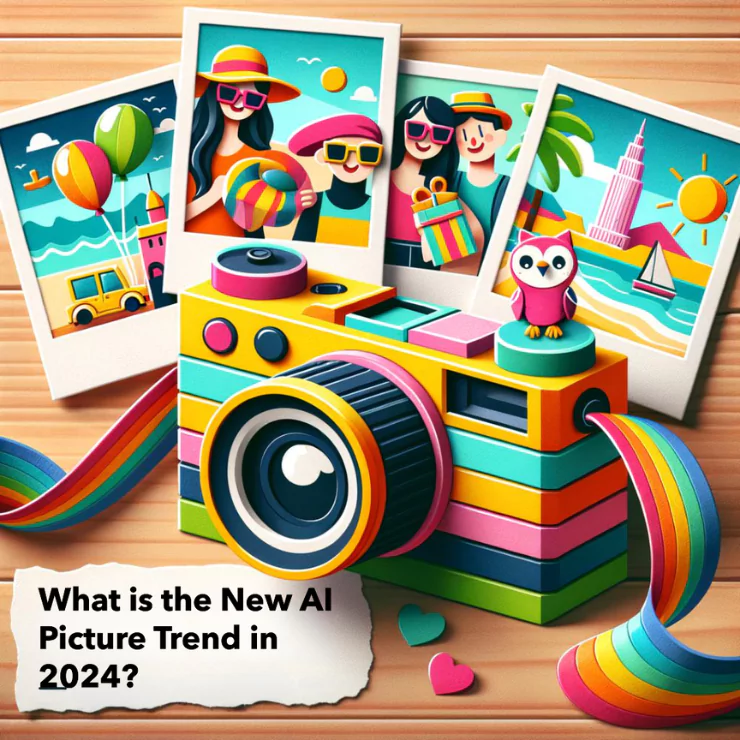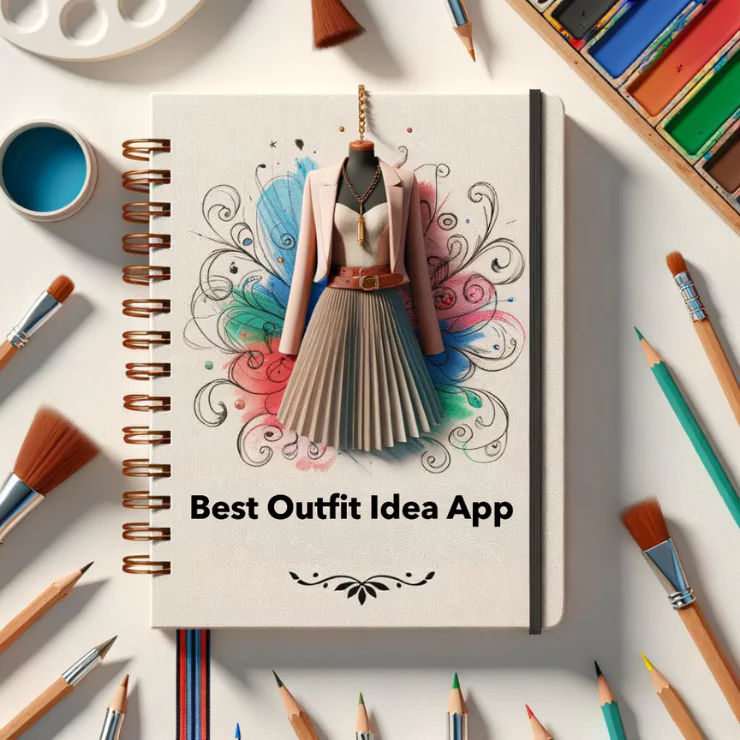AI image-to-image generators are powerful tools that can transform any image into another one using advanced algorithms and deep learning models. Whether you want to create gorgeous artwork, enhance your photos, or generate realistic or abstract images from text, AI image-to-image generators can help you unleash your creativity and achieve amazing results.
But how do you choose the best AI image-to-image generator for your needs? What are the key features and functionalities that you should look for? And what are the top AI image-to-image generators available in the market today?
In this article, we will answer these questions and more as we explore the world of AI image-to-image generation and review some of the best tools for creatives. We will also give you some tips on how to choose the right tool for you and what to expect from the future of AI image-to-image generation.
Key Features to Consider
Before we dive into comparing the top AI image-to-image generators, let’s first understand the key features and functionalities you should consider when choosing an AI image-to-image generator. Here are some of the most important ones:
Functionality:
Text-to-image vs Image-to-image editing capabilities:
Some AI image-to-image generators can generate images from text descriptions, while others can only edit existing images. Depending on your needs and preferences, you may want to choose a tool that can do both or one that specializes in one of them.
Ability to control style transfer, object manipulation, and creative effects:
Style transfer is the process of using the style of one image to another, such as making a photo look like a painting. Object manipulation is the process of changing the shape, size, position, or appearance of objects in an image, such as removing or adding elements. Creative effects are the process of applying filters, colors, textures, or other enhancements to an image, such as making it look like a sketch or a cartoon. Depending on your goals and vision, you may want to choose a tool that gives you more or less control over these aspects of image-to-image generation.
User Interface:
Ease of use and learning arc for beginners and experienced users:
Some AI image-to-image generators are more user-friendly and intuitive than others and have a lower learning curve for beginners. Others may require more technical skills and knowledge and have a higher learning curve for experienced users. Depending on your level of expertise and comfort, you may want to choose a tool that suits your needs and expectations.
Importance of clear prompts and control options:
Some AI image-to-image generators have clear and simple prompts and control options that guide you through the process of image-to-image generation and allow you to adjust the parameters and settings easily. Others may have more complex and vague prompts and control options that may confuse or frustrate you and limit your ability to customize the output. Depending on your preference and patience, you may want to choose a tool that has clear and easy prompts and control options.
Output Quality:
Resolution, detail level, and ability to generate realistic or artistic styles:
Some AI image-to-image generators can produce high-resolution, detailed, and realistic images that look like they were taken by a camera or drawn by a human. Others may produce low-resolution, blurry, or unrealistic images that look like they were generated by a computer or a child. Depending on your purpose and taste, you may want to choose a tool that can create high-quality images in the style that you want.
Consistency in generating high-quality images:
Some AI image-to-image generators can consistently generate high-quality images, regardless of the input or the settings. Others may have more variability and unpredictability in their output and may sometimes generate low-quality or undesirable images. Depending on your reliability and satisfaction, you may want to choose a tool that can consistently generate high-quality images.
Top AI Image-to-Image Generators
Now that we have examined the essential features and functionalities you should consider when choosing an AI image-to-image generator let’s look at some of the top AI image-to-image generators available on the market today. We will check their pros and cons and reach them based on the qualities and functionalities that we have mentioned above. Here are the top AI image-to-image generators that we will review:
- Getimg.ai
- Dezgo.com
- Visme.co
- Runwayml.com
- ZMO.AI
Getimg.ai
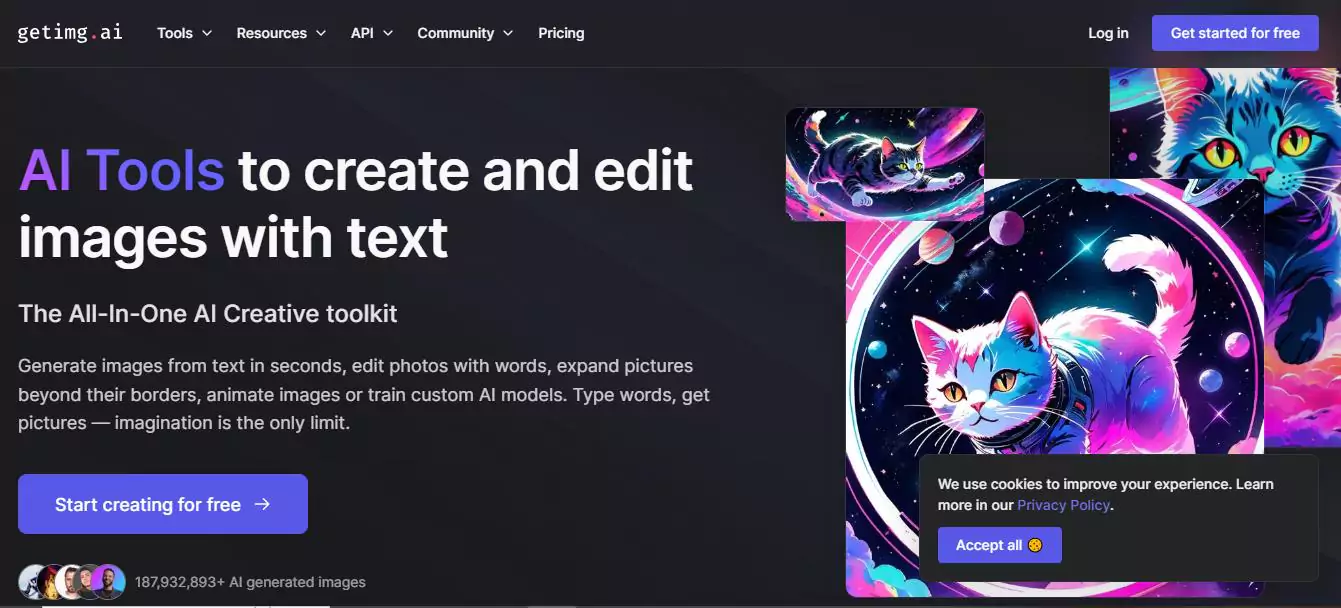


Getimg.ai is an AI image-to-image generator that can generate images from text descriptions using natural language processing and generative adversarial networks. You can type any text description, such as “a cat wearing a hat,” and getimg.ai will generate an image corresponding to your description. You can also edit the generated image by changing the text description or by using the sliders to change the brightness, contrast, saturation, and sharpness of the image.
Features of Getimg.ai
Functionality: getimg.ai can generate images from text descriptions but cannot edit existing images. It can also control the style transfer, object manipulation, and creative effects of the generated image by changing the text description or by using the sliders.
User Interface: getimg.ai has a simple and reflexive user interface that is easy to use and comfortable to learn for beginners and experienced users. It has clear and simple prompts and control options that guide you through the process of image-to-image generation and allow you to adjust the parameters and settings easily.
Output Quality: getimg.ai can produce high-resolution, detailed, and realistic images that look like they were taken by a camera or drawn by a human. It can also generate images in various styles, such as realistic, cartoon, sketch, or painting. It can consistently generate high-quality images, regardless of the input or the settings.
Dezgo.com
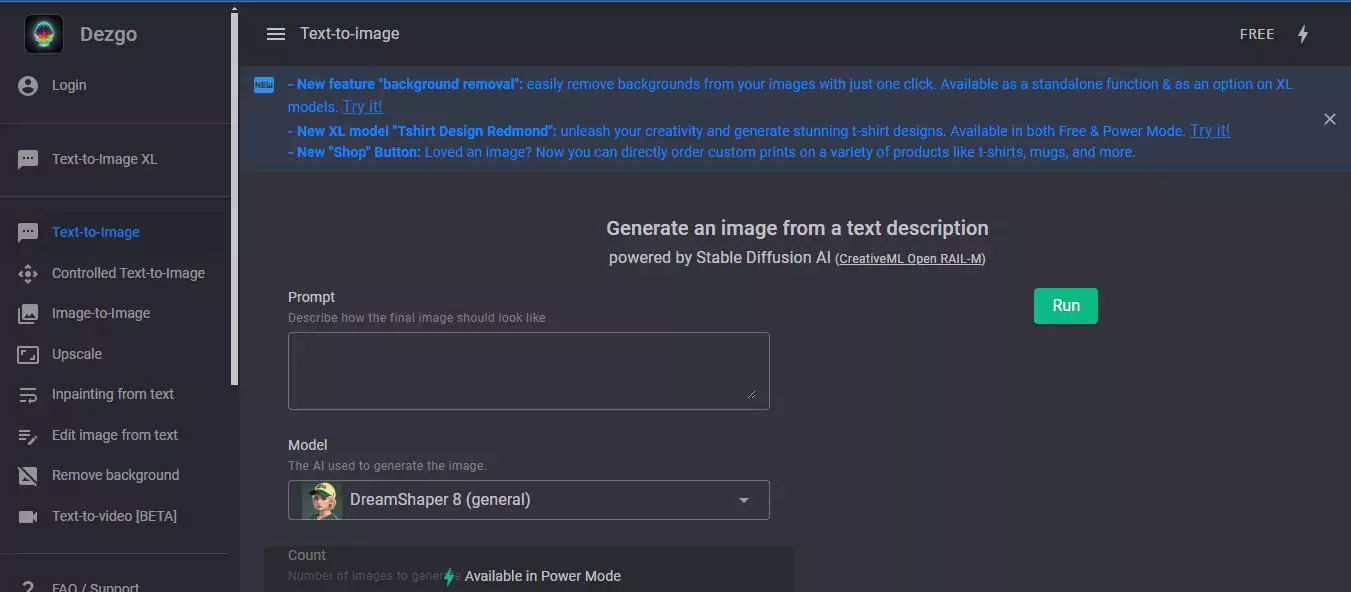


Dezgo.com is an AI image-to-image generator that can edit existing images using deep learning models and neural style transfer. You can upload any image, and dezgo.com will apply the style of another image to it, such as making a photo look like a painting. You can also edit the edited image by changing the style image or by using the sliders to adjust the style strength, color preservation, and smoothness of the image.
Features of dezgo.com
Functionality: dezgo.com can edit existing images but cannot generate images from text descriptions. It can also control the style transfer of the edited image, by changing the style image, or by using the sliders. It cannot control the object manipulation and creative effects of the edited image, as it only applies the style of another image to it.
User Interface: dezgo.com has a simple and intuitive user interface that is comfortable to use and easy to learn for both beginners and experienced users. Its clear and simple prompts and control options guide you through the process of image-to-image generation and allow you to adjust the parameters and settings easily.
Output Quality: dezgo.com can produce high-resolution, detailed, and artistic images that look like they were painted by a human. It can also generate images in various styles, such as impressionist, expressionist, abstract, or modern. It can consistently generate high-quality images, regardless of the input or the settings.
Visme.co
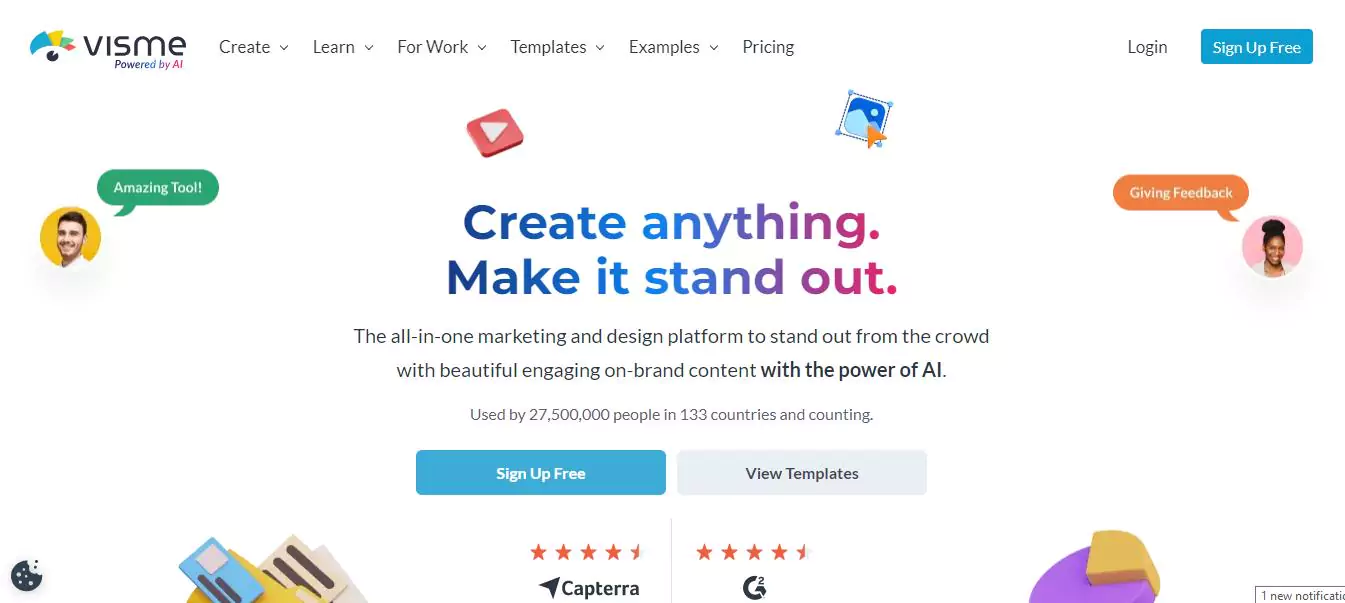


Visme.co is an AI image-to-image generator that can edit existing images using deep learning models and neural style transfer. You can upload any image or video.co will apply the style of another image to it, such as making a photo look like a painting. You can also edit the edited image by changing the style image or by using the sliders to adjust the style strength, color preservation, and smoothness of the image.
Features of visme.co
Functionality: visme.co can edit existing images but not generate images from text descriptions. It can also control the style transfer of the edited image, by changing the style image, or by using the sliders. It cannot control the object manipulation and creative effects of the edited image, as it only applies the style of another image to it.
User Interface: visme.co has a simple and intuitive user interface, that is easy to use and learn for beginners and experienced users. It has clear and simple prompts and control options that guide you through the process of image-to-image generation and allow you to adjust the parameters and settings easily.
Output Quality: visme.co can produce high-resolution, detailed, and artistic images that look like they were painted by a human. It can also generate images in various styles, such as impressionist, expressionist, abstract, or modern. It can consistently generate high-quality images, regardless of the input or the settings.
Runwayml.com
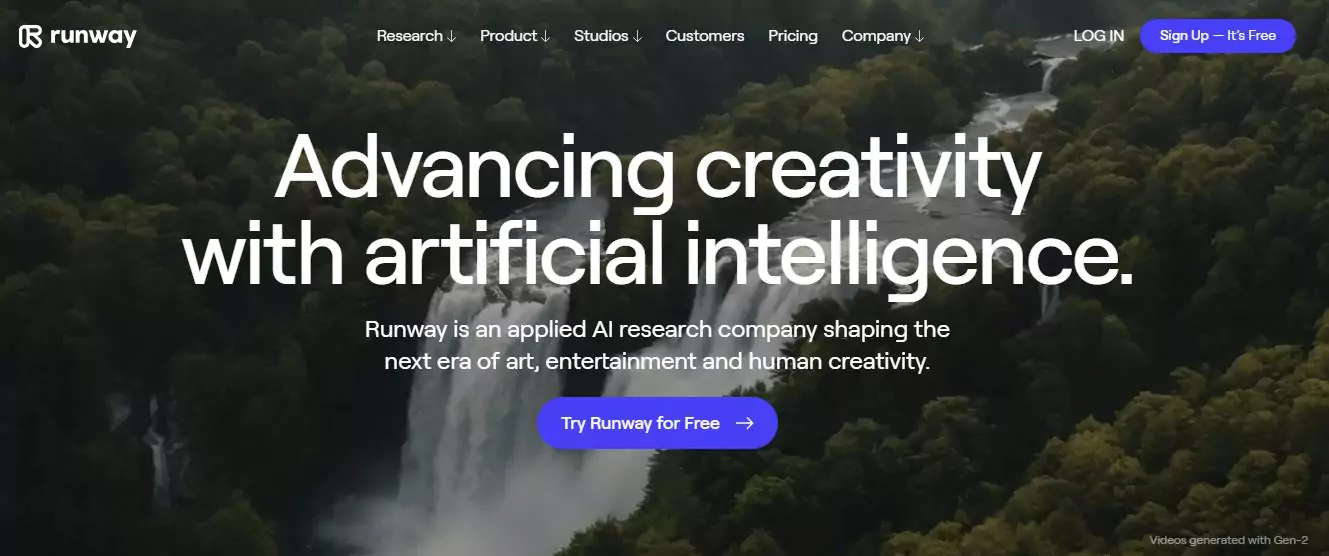


Runwayml.com is an AI image-to-image generator that can generate images from text descriptions or edit existing images using deep learning models and generative adversarial networks. You can type any text description, such as “a cat wearing a hat,” and runwayml.com will create an image that corresponds to your description. You can also upload any image, and runwayml.com will apply the style of another image to it, such as making a photo look like a painting. You can also edit the generated or edited image by changing the text description and the style of the image or by using the sliders to change the brightness, contrast, saturation, and sharpness of the image.
Features of runwayml.com
Functionality: runwayml.com can generate images from text descriptions or edit existing images. It can also control the style transfer, object manipulation, and creative effects of the generated or edited image by changing the text description, the style image, or by using the sliders.
User Interface: runwayml.com has a simple and intuitive user interface that is easy to use and easy to learn for beginners and experienced users. It has clear and simple prompts and control options that guide you through the process of image-to-image generation and allow you to adjust the parameters and settings easily.
Output Quality: runwayml.com can produce high-resolution, detailed, and realistic or artistic images that look like they were taken by a camera or drawn by a human. It can also generate images in various styles, such as realistic, cartoon, sketch, or painting. It can consistently generate high-quality images, regardless of the input or the settings.
ZMO.AI
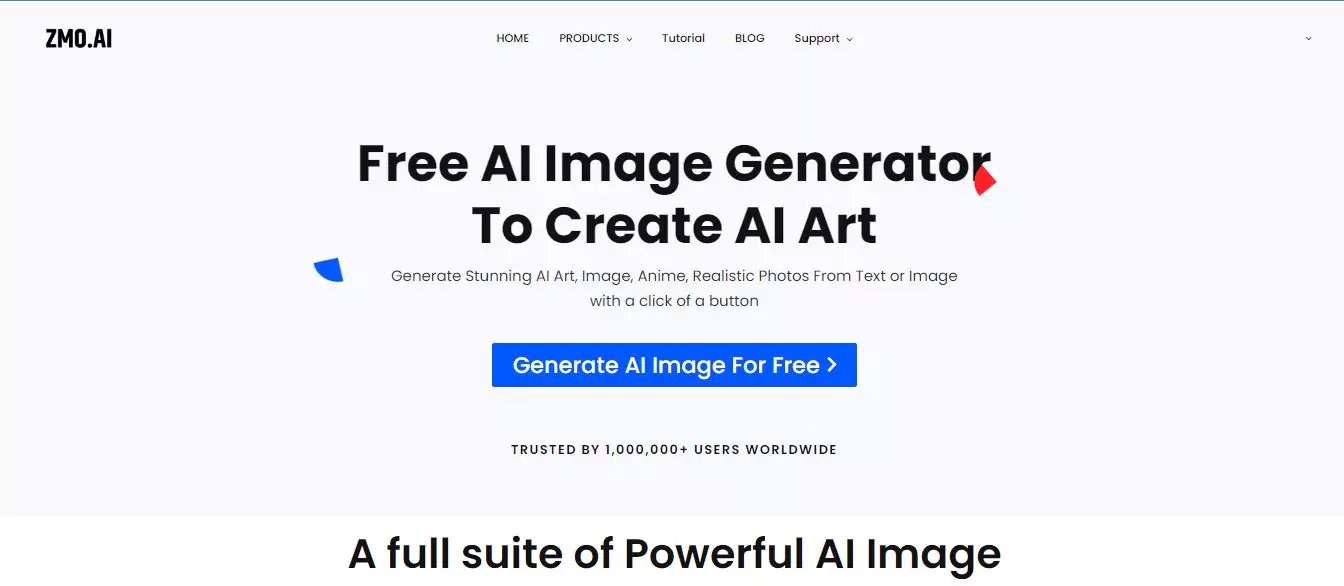


ZMO.AI is an AI image-to-image generator that can generate images from text descriptions or edit existing images using deep learning models and generative adversarial networks. You can type any text description, such as “a cat wearing a hat,” and ZMO.AI will create an image that corresponds to your description. You can also upload any image, and ZMO.AI will apply the style of another image to it, such as making a photo look like a painting. You can also edit the generated or edited image by changing the text description and the style of the image or by using the sliders to change the brightness, contrast, saturation, and sharpness of the image.
Features of ZMO.AI
Functionality: ZMO.AI can generate images from text descriptions or edit existing images. It can also control the style transfer, object manipulation, and creative effects of the generated or edited image by changing the text description, the style image, or by using the sliders.
User Interface: ZMO.AI has a simple and intuitive user interface that is easy to use and easy to learn for beginners and experienced users. It has clear and simple prompts and control options that guide you through the process of image-to-image generation and allow you to adjust the parameters and settings easily.
Output Quality: ZMO.AI can produce high-resolution, detailed, and realistic or artistic images that look like they were taken by a camera or drawn by a human. It can also generate images in various styles, such as realistic, cartoon, sketch, or painting. It can consistently generate high-quality images, regardless of the input or the settings.
Choosing the Right Tool for You
There are many AI image-to-image generators available in the market, but not all of them are suitable for your needs and preferences. How do you choose the right tool for you? Here are some factors to consider:
Budget:
AI image-to-image generators vary in their pricing models. Some are free, some are subscription-based, and some are pay-per-use. Depending on your budget and frequency of use, you may want to compare the costs and benefits of different tools. For example, if you only need to generate a few images occasionally, you may opt for a free or pay-per-use tool. However, if you need to generate a large number of images regularly, you may prefer a subscription-based tool that offers unlimited access and more features.
Desired functionalities:
AI image-to-image generators also differ in their capabilities and functionalities. Some are more general-purpose, while some are more specialized. Depending on your desired functionalities, you may want to choose a tool that can handle different types of inputs and outputs, such as sketches, photos, paintings, cartoons, etc. You may also want to choose a tool that can perform different tasks, such as style transfer, colorization, enhancement, etc.
Level of creative control:
AI image-to-image generators also vary in their level of creative control. Some are more automated, while some are more interactive. Depending on your level of creative control, you may want to choose a tool that allows you to adjust different parameters and settings, such as style, intensity, resolution, etc. You may also want to choose a tool that allows you to preview, edit, and save your results.
One of the best AI image-to-image generators that meets all these criteria is ZMO.AI’s image to image tool. This tool is a powerful and adaptable tool that can generate high-quality and realistic images from any input. You can use this tool to make attractive artwork, enhance your photos, or transform your sketches into realistic images. You can also customize your effects by choosing from different styles, filters, and effects. You can try this tool for free and upgrade to a premium plan if you want to access more features and functionalities.
The Future of AI Image-to-Image Generation
AI image-to-image generation is a rapidly evolving and exciting field that has many possible applications and implications for the future of creativity, art, and communication. As AI image-to-image generators become more advanced and accessible, we can expect to see more diverse and innovative uses of this technology, such as:
Enhancing and transforming personal and professional photos:
AI image-to-image generators can help people enhance and transform their photos by applying different styles, effects, or filters or by changing the objects, backgrounds, or perspectives of the photos. This can help people express themselves, share their stories, or create memorable moments with their photos.
Creating and exploring new forms of art and media:
AI image-to-image generators can help artists and creators create and explore new forms of art and media by generating images from text descriptions or by editing existing images. This can help artists and creators unleash their imagination, experiment with different styles and genres, or collaborate with other artists and creators.
Generating and visualizing data and information:
AI image-to-image generators can help researchers and professionals generate and visualize data and information by generating images from text descriptions or by editing existing images. This can help researchers and professionals communicate their findings, insights, or ideas or create engaging and informative presentations, reports, or publications.
Conclusion
AI image-to-image generators offer a vast array of creative possibilities, from transforming photos to generating artwork from text descriptions. When selecting the right tool, consider factors like functionality, user interface, and output quality. Among the top choices, ZMO.AI stands out for its versatility, allowing both text-based generation and image editing with intuitive controls and high-quality results. As AI continues to advance, the future of image generation promises even more exciting applications in personal expression, artistic exploration, and data visualization.


